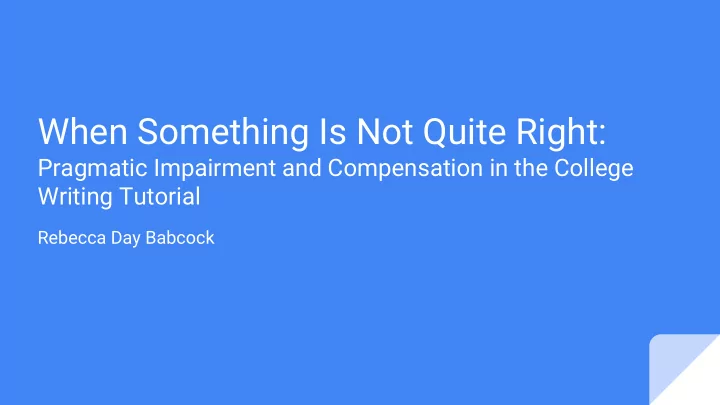

When Something Is Not Quite Right: Pragmatic Impairment and Compensation in the College Writing Tutorial Rebecca Day Babcock
Talking the talk -All talk follows the unwritten rules of pragmatics. -Pragmatics: [the study of] the use of linguistic and non-linguistic capacities for the purpose of communication. (Perkins, 10) -”Tutoring talk” is not the same as regular conversation- the rules apply differently. -There are certain approaches that tutors are inclined to take (directive/ non-directive)
Cont. - The tutor/tutee conversation aims for a goal and requires cooperative behavior. - Cooperative Principle: Make your conversational contribution such as required, at the stage which it occurs, by the accepted purpose or direction of the talk exchange in which you are engaged. (Grice 26) - When this principle is violated, an individual must determine why the other party is indirect or ambiguous and figure out how to play along accordingly.
Pragmatic Impairment - Some individuals are unable to “play along” or adjust to certain conversational situations. - This is known as pragmatic impairment. It is associated with diagnoses such as Asperger’s syndrome, autism, learning disability, traumatic brain injury and attention deficit disorders. - Some features: Problems understanding sarcasm, indirect requests, irony, punchlines of jokes, indirect responses, lies, ambiguity, text and discourse processing, and others’ mental states, attitudes and emotions.
Pragmatic Impairment and Tutoring - In conversation, unimpaired individuals will often compensate for the other person in order to create a balance in conversation. - In a tutoring situation, however, such compensation may be against the “rules” or may not coincide with the preferred method. - Tutors who are trained or told to use the non-directive approach might not automatically offer up words or fill in the blanks for the tutee. Researchers Kiedaisch and Dinitz found that tutees with learning disabilities - rated tutoring sessions lower than any other group, reporting the need for more precise assistance from tutors.
The Session - Tutor: Older woman with a degree in Special Education - Tutee: 21 year old woman with a learning disability - The tutee informed both the researcher and the tutor about her learning disability. - Interaction: p. 269 - Inference: understanding the reasons behind why a person might ask a particular question or make a particular statement. - A person with a pragmatic impairment may take requests literally or misunderstand intentions. - In this example, the tutor is prompting the tutee to enhance her argument or generate examples. However, the tutee is under the impression that the tutor is truly interested in the plot of the novel. - The inferential burden must be taken on by the unimpaired individual, who is required to be more linguistically explicit and leave less to infer.
Moving the Session Forward - Meta-discourse during or after the session - Tutor: I’m just trying to help you… What would you have me do? - Tutee: I don’t know. Just read it and let me know what you think or something. - Tutor: I’m trying. - Tutee: You’re not telling me, though. - Post session interview: - Tutee explained that she liked when the tutors gave “tips” and wished the tutor would explain more. She explained that her other tutors would push her more and give her ideas.
Cont. - Illocutionary Force Indicating Devices (IFIDs) - Facial expressions, pauses, intonation, and discourse markers. (may be hard for individuals with pragmatic impairments to understand) - More explicitly: “I have to recommend that you do it this way” and “That’s just a suggestion” - In this session: - In place of “I don’t have to to read the story, I have to read your paper” the tutor could have said “I am asking these questions to help you come up with ideas about what to put in the paper” - In order to follow the non-directive tutoring style, tutors will use open-ended questions when the intention is really directive. It is important to be explicit when there is confusion or misunderstanding to avoid frustration. (p 270) - Tutors should recognize that an impaired person is not being intentionally difficult or resistant.
Suggestions (Perkins, Pragmatic ) -Provide backchannel feedback and encouragement - Such as engaged listening, positive remarks and motivation. - Ask questions to help the person focus - Reformulate utterances to provide model sentences - Provide a linguistic formulation when the person is only able to produce a gesture.
Conclusion - It is hard to comprehend how non-directive tutoring can be frustrating to a person with pragmatic impairment. - Tutors should be taught to recognize signs of pragmatic impairment and be able to compensate or use tactics like explicit IFIDs and meta-discourse. - Sometimes tutors will have to be direct, offering words, phrases or making specific suggestions, in order to move sessions forward and avoid frustration.
Work Cited Babcock, Rebecca Day. “When Something is not Quite Right: Pragmatic Impairment and Compensation in the College Writing Tutorial.” The Oxford Guide for Writing Tutors. 267-273. Print. Grice, Paul. Studies in the Way of Words. Cambridge: Harvard UP, 1991. Print. Kiedisch, Jean and Sue Dinitz. “Learning More from the Students.” The Writing Center Journal 12.1 (1991): 90-100. Web. 26 May 2010. Perkins, Michael. Pragmatic Impairment. Cambridge: Cambridge UP, 2007. Print.
Recommend
More recommend